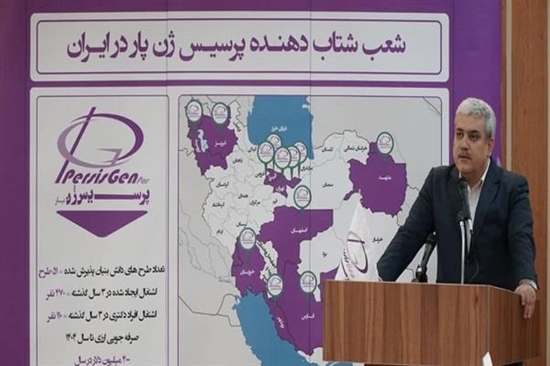Sorena Sattari in the Ceremony for Concluding the Contract for Seven Technologies of PersisGen Accelerator:
The ecosystem of biological technologies will be improved by the accelerators of the field
The vice president for science and technology affairs talked about the improvement of the biotechnology ecosystem with the help of the private sector accelerators, adding: this accelerator has become a successful model for other fields

The vice president for science and technology affairs talked about the improvement of the biotechnology ecosystem with the help of the private sector accelerators, adding: this accelerator has become a successful model for other fields, and role-playing of more than 20 biotechnology accelerators leads to the flourishing of the ecosystem in the region and turning innovative ideas into products with a high value added.
According to the information center of national elites foundation, the knowledge-based activists producing seven biotechnology products, successfully derived from PersisGen accelerator, concluded contracts with investors in Razi Hall in the presence of the vice president for science and technology affairs, and Mostafa Ghanei, the secretary of biotechnology development headquarter.
Successful Model of Accelerators and Biotechnology Flourishing
During the ceremony, Sattari talked about the effectiveness of accelerators on turning ideas into products, adding: more than 100 accelerators have turned innovative ideas into products in various technological fields. In addition, there are more than 20 active accelerators in the fields of biotechnology and production of advanced bio and recombinant drugs, thereby placing the biotechnology of the country on the path of entrepreneurship.
Sattari announced the success of implementing the pattern of accelerators in biotechnology, expressing: during the first days, we did not how much an accelerator in the field of biotechnology could be successful. Fortunately, the accelerator model in the field of biotech has become a successful model in the boom in the relationship between technology and industry.
He continued: companies that have left PersisGen accelerator and become large companies have reached several billion tomans. Sattari regarded the remarkable progress made by the biotech and knowledge-based companies in this area as an appropriate model of real production culture and an indication of the need to transition from an importer's and factory's attitude, affirming: if we are unable to produce automobiles and fail to optimize our production line, management and innovation, we have not gone beyond establishing factories that only need technicians. Iran's biotech industry now designs and optimizes equipment, machinery and processes domestically in addition to raw material production, which means that the ecosystem of innovation in the field of biotechnology has matured. This ecosystem should be perfect for all areas of technology as well.
The president of the national elites foundation regarded keeping the creative youth and elites in fields of medicine, pharmacy, and biotechnology as another valuable effect of flourishing the biotechnology ecosystem, adding: the pharmacy graduates have rarely emigrated from the country since the active companies of the field have welcomed them with open arms.
The president of the biotechnology development headquarter talked about the importance of investment of the private sector in support of innovative ideas, continuing: properly recognizing the importance of innovative priorities, the private sector supports and guides efficient and creative young creative ideas in product development, value added creation and development.
Safekeeping of the Market and Domestic Knowledge-based Producers
Emphasizing the key role of the food and drug organization in support of innovative ideas and entrance of Iranian-made advanced drugs into the market, Sattari marked: this organization is one of the most sensitive and crucial parts of the country. Fortunately, it evaluates the entire product and approves its entrance into the market. The attitude of this organization in support of innovative production of food and drugs must be found in other organizations. The pharmaceutical sector is in a difficult battle with import-based structures and it is the support of decision-makers and influencers who can help domestic innovation companies.
Emphasizing the necessity of safekeeping of the market and domestic knowledge-based producers, Sattari expressed: advanced and successful countries support their market. The doors of the domestic market should not be open to the import culture so that domestic producers could be better targeted. Raw-selling and resource-based culture has moved on the import circuit for many years and has no regard for the domestic producer. But, this approach is transformed by the transformation of the knowledge-based economy and the innovative culture it brings with it.
The Leading Soldiers in the Fight with Raw Culture and Importer
The president of the knowledge-based economy and culture-building technologies development headquarter considered young and creative activists at knowledge-based companies and startups as soldiers at the forefront of the fight against raw-selling culture and importers, adding: while the importing culture has been existing in the country for several years, the creative and entrepreneurial youth working in the field have the weapon of motivation and innovation. All sectors of the society must work together to be successful. No power can block a young person who has the will and self-confidence.
The vice president for science and technology affairs talked about the full preparedness of the Vice-Presidency for support of accelerators and laying the foundation for the presence of the private sector, expressing his hope that investors of the country will come to the realization that investment on the creative and entrepreneurial youth of the country is not merely an idea and rather a new economy and culture. This culture will eliminate the culture of raw-selling and uses efficient innovative tools to make advancement in the country. Animal and human food production and bioavailability is a priority of support for science and technology.
In another part of the ceremony, Mostafa Ghanei, the secretary of biotechnology development headquarter, mentioned that a serious transformation has been made in drug field of Iran, asserting: one of the criticisms was that university technology is not applicable, but now technology is just a few steps ahead of the industry needs.
Concluding Seven Contracts for Biotechnology Products
During the ceremony, seven products derived from PersisGen in fields of monoclonal antibodies, poultry vaccines plasma derivatives products, and probiotic products were invested by the private sector and the industry.
In total, 13 advanced drug technologies were presented, seven of which were invested in the presence of the vice president for science and technology affairs.
PersisGen accelerator supports innovative ideas in the biotechnology field and turns ideas into products to be presented to the market. The accelerator has been established for three years and has supported 19 projects, four of which have entered the market and two have undergone clinical examination.
Fibroblast growth factor, anti-rabies project, anti-hepatitis b serum, rogue product, probiotic mouthwash, ELISA kit, and avian influenza vaccine are the technological products that received investment in the ceremony.






 adress : No. 209 , between Navab Str and Roudaki Str. Azadi Str. Tehran - Iran
adress : No. 209 , between Navab Str and Roudaki Str. Azadi Str. Tehran - Iran  phone: +98 21 63478000
phone: +98 21 63478000